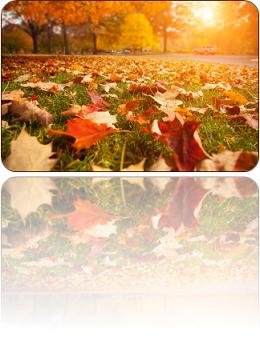Falling Leaves
Falling Leaves
October … November …
Reformation … Thanksgiving …
Yes, but also beauty, dying, death.
The red-yellow falling leaf … October splashes beauty and death before our eyes in one breath. Through nature, God paints beauty in death. No other month is quite like it.
The coloring, falling, decomposing: in all of this autumn leaves speak to us. Examining them one by one, raking them in piles – autumn leaves address us. Especially about death.
 In one sense, we are all leaves waiting for our season, knowing death will come. Not that we really know what death is. We know, of course, a proper definition of death. We know that death, in its broadest sense, is threefold: spiritual, physical, eternal. We know, too, that each sense is definable in terms of separation. Physical death denotes separation of soul and body; spiritual death, separation of God and soul; eternal death, separation of God from soul and body in eternal perdition.
In one sense, we are all leaves waiting for our season, knowing death will come. Not that we really know what death is. We know, of course, a proper definition of death. We know that death, in its broadest sense, is threefold: spiritual, physical, eternal. We know, too, that each sense is definable in terms of separation. Physical death denotes separation of soul and body; spiritual death, separation of God and soul; eternal death, separation of God from soul and body in eternal perdition.
But there is something awesome about death – even physical death that we can't grasp. Unnatural before the fall, chosen in the fall, and inevitable since the fall, death spells separation in unspeakable reality. That's why we never need say much at the time of death. Death itself preaches a most powerful sermon.
Due to our depravity, however, we do not always feel the full weight of death's sermon. Hence, no wonder attitudes to death are so diverse. The blatant infidel defies death until his last breath. The stoic pretends not to fear it. The Christian Scientist denies it. The despairing seek it. The Moslem fanatic hopes to earn a martyr's crown through it.
Most of us, however, are death-escapists. Inwardly, we tend to pattern Louis XV who forbade his servants to mention the word in his presence. For fear of facing death, Western society in particular substitutes other words, shallow condolences, flowery coffins. Blocking out personal death, we envisage others dying before ourselves. As Puritan Nehemiah Rogers noted: "There is none so old but thinks he may live one year longer."
Nevertheless, nothing is so sure as death. Often uncertain events on earth that never transpire are planned for in detail, but how few efforts are put forth to prepare for inevitable death! Many prepare more for a week's vacation than for an all-decisive journey to eternity.
The true Christian also must die. "A godly man is free from the sting, but not from the stroke; from the curse, but not from the cross of death," George Swinnock wrote. Though taught to face death before death comes, true believers still need dying grace in death's black hour of power. Even Moses, who witnessed more deaths than any person on earth more than half a million in forty years – prayed, "Teach us, O Lord, to number our days, that we may apply our hearts to wisdom" (Ps. 90:12).
Away then with the myth that Jordan's river of death is always an easy passageway for God's child! Though stripped of its terrors, robbed of its sting, and disarmed of its victory, death remains for God's saint the last conflict and enemy.
Many are the reasons for the death struggle. Earthly tent-stakes rooted too deeply, a torturing Satan, deathbed-darkening sins – especially those of omission, all can play a role. Tasks ordered by God and left undone, bitter disputes not assuaged, reconciliations not sought, domestic duties often intended, and, above all, feeble returns of gratitude to God – in a word, poor loving of God above all and my neighbor as myself – may all be gnawing worms which make the believer fear Luther's assertion on his deathbed: "The road to hell is paved with good intentions."
Nevertheless, the saints' sins shall not "unsaint" them for heaven. For all their saintliness lies firmly anchored in Christ. He is both their justification and sanctification (1 Cor. 1:30).
God deals with His own as sovereignly in their dying as He did in their living. Happily, for most he enlarges their hope of heaven to master their fear of death. He eases the passageway of death into faith's victorious jubilee at His time, granting inward assurance that Scripture also calls their death "precious in the sight of the Lord" (Ps. 116:15), a being "carried by the angels into Abraham's bosom" (Luke 16:22), a going to paradise (Luke 23:43), an admission into the Father's house of "many mansions" (John 14:2), a blessed "departure" (2 Tim. 4:6), a "gain" (Phil. 1:21), "a falling asleep in the Lord" (1 Thess. 4:13), and a departing "to be with Christ" (Phil. 1:23) "to be at home with the Lord" (2 Cor. 5:8).
True Christ-given faith overcomes the world (1 John 5:4) – death inclusive. As Prophet, Christ grants His elect faith to be obedient to die; as High Priest, faith to rest upon Him in dying; as King, faith to surrender soul and body into His hands as rightful Lord.
Never so clearly are the advantages of exercised faith preached as on saints' deathbeds. Without faith, the swellings of Jordan may be nothing but terror; with faith, heaven and glory are viewed near at hand with joy. Wrought by the Captain of salvation, faith's spiritual courage can make the saints "conquerors, and more than conquerors" even in the heat of death's dark passage and painful agony. How like beautiful nearly-falling leaves do true believers sometimes appear prior to forsaking their clay tabernacles, believing that they have a house not made with hands, eternal in the heavens, and persuaded "that neither death, nor life, nor angels, nor principalities, nor powers, nor things present, nor things to come, nor height, nor depth, nor any other creature, shall be able to separate us from the love of God, which is in Christ Jesus our Lord!" (Rom. 8:38-39).
But whether the valley-of-death journey for true believers be arduous or joyous, God shall make it a time of spiritual growth. Their deathbeds may yield spiritual growth in many divine graces, particularly the three jewels of hope, faith, and love. Read only the deathbed expressions of Thomas Halyburton and John Brown of Haddington, if you would witness spiritual growth through joyous death. "Death, here I am," Halyburton could say, "you can possess me, for I already possess you."
Too often, however, we assume that spiritual growth must always channel through special jubilee embracements of faith, hope, and love, forgetting that the "small print" trials of these jewels often yield more real growth than their "headline" victories. One difficult deathbed may yield as much spiritual growth as many joyous ones. For on a dark deathbed – battling with satanic unbelief, past and present sins, sins of omission, and a host of other enemies, while grasping for a seemingly deserting God and hidden Christ, the Holy Spirit causes the missing believer to grow.
 How does he then grow? In dependence upon God, in debtorship to free grace, in self-condemnation and divine-justification, in holy submission at God's throne, in esteeming God higher than His graces, in sin-crucifixion and sin-hatred, in godly humility, in walking by faith rather than sight, in being weaned from the world and worldliness, in preparation for heaven's heavenliness, in a multitude of like graces.
How does he then grow? In dependence upon God, in debtorship to free grace, in self-condemnation and divine-justification, in holy submission at God's throne, in esteeming God higher than His graces, in sin-crucifixion and sin-hatred, in godly humility, in walking by faith rather than sight, in being weaned from the world and worldliness, in preparation for heaven's heavenliness, in a multitude of like graces.
This is his beauty in dying: he grows. Growth is what counts – even in dying. Growth is greater than joy. As spiritual growth is more important than minimal affliction in living, spiritual growth is of more value than joy in dying.
That's why Thomas Fuller prayed: "Lord, be pleased to shake my clay cottage before Thou throwest it down; make it totter awhile before it doth tumble; let me be summoned before I am surprised; but above all, suffer my dying bed to serve as a vehicle of spiritual growth to escort me forward as a formed vessel of mercy toward spiritual adulthood in heavenly glory."
Seek spiritual growth more than spiritual joy in living and in dying, and you will receive more joy in the wake of growth, than growth in the wake of joy. Happiness is not found when sought as an end in itself, but is always discovered as a byproduct of real growth.
The true believer, through a thorny or restful deathbed, falls like a red autumn leaf, full of color, for he is purchased by the blood of Christ. His body is also decomposed, but unlike leaves, only temporarily. The gospel preaches what nature never can: In Christ, he shall rise again; stained blood-red, his leaf shall not wither but be forever grafted into the Vine in everlasting bliss and beauty.
How dear to God the dying of His people!
Praise Him, ye saints, and sound His Name abroad. Psalter 426:8
True believer, your cause is God's in Christ Jesus. You are better off in His hands than in your own. You shall receive grace sufficient for each hour – also for death's hour. The night prior to his execution, John Hooper placed his finger in the flame of a candle to anticipate "tomorrow's" pain, but could not bear it. The next day, refusing to recant, he was burned to ashes outside his cathedral at Gloucester.
By grace, God paints beauty in the "Octobers" of His people. Their "life" comfort is sufficient to be their "death" comfort: "That I with body and soul, both in life and death, am not my own, but belong unto my faithful Savior, Jesus Christ, who with His precious blood, hath fully satisfied for all my sins" (Heid. Cat., Q. 1).
Beauty, red-stained beauty, in dying. No other death, no other life, no other beauty, is quite like it. No other comfort takes in "life and death" in one breath.
Lord, make it – keep it – mine.

Add new comment